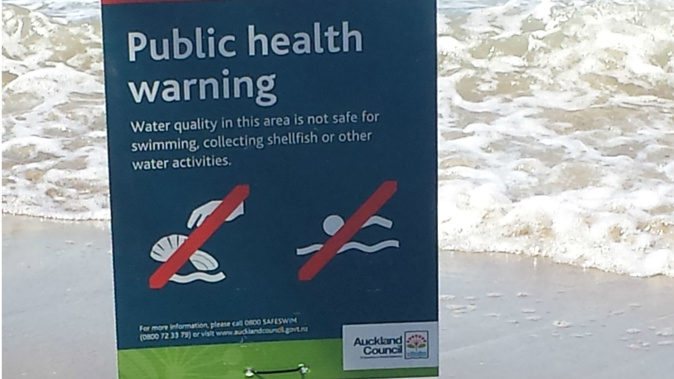
Sewage overflows are creating a stinky situation for many New Zealand beaches as sewerage systems fail to cope with heavy rainfall.
Health warnings were issued at 11 popular beaches across Auckland yesterday following torrential downpours, but the country's largest city is not the only place affected, with many alerts also in place in Christchurch, Nelson and the Manawatu-Whanganui region.
In total, more than 100 beaches, rivers and streams in New Zealand currently have cautionary notices in place for swimming, according to the Land, Air, Water Aotearoa (LAWA) website, with about 60 of those deemed unsuitable for swimming.
The Christchurch City Council website shows 14 beaches and rivers are currently rated between poor and very poor and are generally considered unsuitable for contact recreation.
Horizons Regional Council is reporting 22 areas to avoid swimming at, and nine others with potential health risks.
The Nelson City Council has also issued a water contact ban after yesterday's rainfall.
"[The] event has resulted in an overflow of untreated sewage and stormwater contaminants into Nelson Haven and Waimea Estuary," a release said.
"The public is advised not to swim or have water contact at Waimea Estuary and the Haven, including Tahunanui Beach, until further notice."
At least 50 beaches in the Auckland region were affected by the weekend's wet weather, with experts saying the number of health warnings issued was the highest yet this summer.
/arc-anglerfish-syd-prod-nzme.s3.amazonaws.com/public/M5ZT66RVNBC4LME7K7BVZN76RY.jpg) Council websites recommend not swimming at beaches or rivers for 48 hours following rainfall. Photo / John Borren
Council websites recommend not swimming at beaches or rivers for 48 hours following rainfall. Photo / John Borren
Safeswim technical leader Dr Martin Neale said some of the warnings were due to heavy rain washing contamination from land into the ocean, but others were triggered by wastewater overflows.
Speaking to the Herald on Saturday, Auckland mayor Phil Goff said there was a scheme in his 10-Year Plan to separate stormwater from wastewater.
This, along with a major new central wastewater interceptor in the pipeline, would help prevent future wastewater overflows.
Goff said more intensive housing and major weather events were putting pressure on the city's wastewater system.
"It's time if we want to be a world-class city in the 21st century, actually to take real action to bring it to an end.
"A higher population, more frequent heavy rainfall events, will exacerbate this problem and make it worse."
Council websites recommend not swimming at beaches or rivers for 48 hours following rainfall due to overland runoff – even if a site generally has good water quality.
Shellfish should also not be taken within that period as they may exceed maximum microbiological guideline levels.
For many public beaches, rivers and streams in NZ, water samples are collected weekly and test the amount of enterococci (E. coli) present in the water.
The resulting figures show how much faecal indicator bacteria (FIB) is in the water.
National guidelines for this bacteria determine when intervention is required. In beach samples, if more than 280 enterococci are detected in 100ml of water, a public warning is required.
Respectively, in river samples, if more than 550 E. coli are present in 100ml of water then warnings are also required.
The most common illness is gastroenteritis but respiratory illness and ear and skin infections may also occur.
The results from water monitoring, including any current water quality warnings, can be found on individual council websites or on the Land, Air, Water Aotearoa (LAWA) website.
Take your Radio, Podcasts and Music with you









